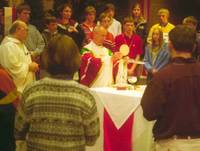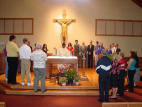Liturgical Abuse of Last Week (TM)

Lest I let a week go by (even in retrospect) without celebrating one of the prevalent abuses of our liturgy (pun intended), I bring to you the 'Con-Celebrating Community.'
"Nor is the Eucharistic Sacrifice to be considered a "concelebration," in the univocal sense, of the Priest along with the people who are present. On the contrary, the Eucharist celebrated by the Priests "is a gift which radically transcends the power of the community. . . . The community that gathers for the celebration of the Eucharist absolutely requires an ordained Priest, who presides over it so that it may truly be a eucharistic convocation. On the other hand, the community is by itself incapable of providing an ordained minister." There is pressing need of a concerted will to avoid all ambiguity in this matter and to remedy the difficulties of recent years. Accordingly, terms such as "celebrating community" or "celebrating assembly" . . . and similar terms should not be used injudiciously" (Redemptionis Sacramentum 42). The purpose of the above Instruction, of course, is not to scrupulously investigate each and every area in which the liturgy might stay, even the slightest bit, from the rubrics, but rather to identify 'symbolic abuses,' which are symptomatic of larger, cultural misunderstandings of the very nature and purpose of the liturgy. This linguistic clarification, then, does not simply intend to quibble about terminology, but rather to correct a larger abuse, a fundamental distortion of the role of the gathered community in the celebration of the liturgical mysteries.
On a side note, note that the phrases mentioned above ('celebrating community, etc.) are not wholly banned from theological/liturgical discourse, nor could they be. The Church herself has used these terms in official documents (e.g., "The celebrating assembly is the community of the baptized who . . .offer spiritual sacrifices [CCC 1141], or the perhaps-unfortunate choice of words in Lumen Gentium 10: "the faithful, in virtue of their royal priesthood, join in the offering of the Eucharist"). Rather, these words must not be 'used injudiciously,' and we might see here, in fact, an attempt to correct or clarify language which has been found to be imprecise or otherwise in need of qualification.
The larger problem is when this language becomes a cloak for an ecclesiological vision which obfuscates the unique significance of the ministerial role of the ordained clergy. Thus we hear, "We need to acknowledge a greater variety of ministers. The truth of the matter is this: All people are ministers to one another. Ministers are not ordained or made so by others; they are born . . . This full, inclusive notion of ministry is the only notion of ministry that will help us to discover and develop the ministry of the celebrating assembly at liturgy" (source). Or the all-too familiar VOTF mantras, generally related to a misinterpretation of Vatican II: "After the Council, the most significant role is the celebrating assembly. The emphasis was concepts like 'community' and 'celebration'" (source). Here's a more profound misunderstanding, arising from a misunderstanding of the role of the minister as 'presider' vis-a-vis the congregation, courtesy of NCR:
"'Do this in memory of me.' To fulfill these words of Christ, we need to recall the liturgical principle: The Church makes the Eucharist and Eucharist makes the Church. What do these words mean? As the celebrating assembly, the Church makes the Eucharist. All the baptized participate in the priestly function of Christ and are appointed for the celebration of divine worship. The priest, acting in the person of Christ, the head of the Church, together with the assembly, the people of God, the Body of Christ, makes the Eucharist. By reason of his ordination, the priest, acting as a representative of Christ, with the assembly fulfills the words of Christ: 'Do this in memory of me.' Priests do not do this alone but in union with other members of the Body of Christ."
Here the ministerial function of the priest is viewed as only quantitatively distinct from that of the congregation, as if both were 'shouldering together' the task of the Eucharistic sacrifice, in the same way that a quarterback and an offensive line share the task of moving the football down the field. What this misses is the ontologically unique character which a priest possesses, entailing his acting in the person of Christ, which is the very fact which enables his sacrificial offering to be acceptable to the Father. The fact that the faithful 'throw in their lot' with this offering does not make it their offering. It is no accident that we ask that 'the Lord accept this sacrifice of your hands, for our good and the good of all His Church.' It is not our sacrifice, simply because we are not Christ, and our sacrifice - apart from His - simply wouldn't do a lot of good, in the grand scheme of things.
 Coupled with this abuse is the more concrete problem of the faithful being invited to 'gather around' the altar during the Eucharistic prayer - an abuse which, unfortunately, Redemptionis Sacramentum neglects to directly address, and which does not seem to have been explicitly addressed by any liturgical norms thus far (please correct me if I'm wrong here - I simply can't find it). The teen organization 'LifeTeen' was notorious for fomenting this abuse among American Catholic youth (that's a LifeTeen mass above left), yet - thankfully - Jimmy Akin posted last week (along with Amy Wellborn) an indication that its leadership has taken positive steps to stop this practice. Lord willing, this is the beginning of a trend. Coupled with this abuse is the more concrete problem of the faithful being invited to 'gather around' the altar during the Eucharistic prayer - an abuse which, unfortunately, Redemptionis Sacramentum neglects to directly address, and which does not seem to have been explicitly addressed by any liturgical norms thus far (please correct me if I'm wrong here - I simply can't find it). The teen organization 'LifeTeen' was notorious for fomenting this abuse among American Catholic youth (that's a LifeTeen mass above left), yet - thankfully - Jimmy Akin posted last week (along with Amy Wellborn) an indication that its leadership has taken positive steps to stop this practice. Lord willing, this is the beginning of a trend.
# posted by Jamie : 9:29 AM
|
|

